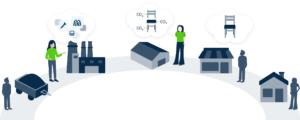When we conducted the interviews for our Frontrunner Report “Spirits of the Future”, I also talked to Tim Etherington-Judge, the co-founder of Avallen Spirits, a Calvados brand from France.
After we’d talked about the ins and outs of how Avallen Spirits had reduced the impact of their Calvados, Tim said something that really stood out to me:
It’s really a part of our company culture. In every decision, we sit down… and think: What could be the most sustainable solution for this?”
This sounds like an obvious take. But think for a second:
Can you think of a company (with more than 5 full-time employees) that really practices this way of thinking?
There’s a lot to be said about the approaches you can take – from an engineering perspective – to make your processes more sustainable. But at the end of the day, environmental impact is like any other topic:
If you have no experience with it, you won’t be very successful in the long run.
Let’s quickly break down how Tim and his team practice this philosophy.
Raw materials
Avallen Spirits chose apples as a raw ingredient mainly due to the low environmental impact. And this has trickled down their entire value chain. They could’ve gone for grains instead (and another kind of liquor), but this would have meant a higher overall impact.
Production process
Instead of using ready-made machinery, Tim and his team instead rely on biomass from their apples to produce the energy needed for the distillation process.
Advertising materials
Avallen’s advertising materials (and packaging labels) are also based on apple starch and completely degradable. Liquor brands heavily rely on point-of-sale advertising in bars and shops – with an often overlooked impact at the material waste level.
Taking the extra step
Many smaller businesses make use of extremely sustainable processes.
But the bigger the companies grow, the harder this becomes. Because it’s more difficult to pull off when scale comes into play. But more importantly: Because sustainability doesn’t have a seat at every table.
I’m preaching to the choir if you’re reading this as a sustainability manager, because capacity building is usually a big part of their job.
Just imagine the last decision you agreed upon with your team: What if sustainability would’ve been a key concern there? Would you have really launched that product? That campaign? Could you have improved the production process? And what was the impact that your more efficient production model has on the environment?
It’s not always black and white. But the next time you make a business decision – even if it’s just in a Zoom call – ask yourself the same question that Tim asks himself all the time:
Is this really the most sustainable thing you can do?


